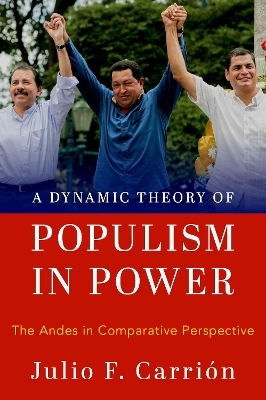
A Dynamic Theory of Populism in Power
Oxford University Press Inc (Verlag)
978-0-19-757229-0 (ISBN)
A Dynamic Theory of Populism in Power provides an analysis of five Latin American populist presidencies, all located in the Andes. In four of them (Bolivia, Ecuador, Peru, and Venezuela), populism became unconstrained and regime change followed. In one case, Colombia, populism in power was successfully contained and democracy survived. The concluding chapter places the Andean cases in comparative perspective and discusses how unconstrained populism in other cases (Nicaragua and Hungary) also led to the end of electoral democracy. Where populism in power was constrained (Honduras and the United States), regime change did not materialize. Carrión advances a theory of populism in power that helps us understand how democracies transition into non-democracies. To that extent, the book illuminates the processes of democratic erosion in our time.
Julio F. Carrión is an Associate Professor in the Department of Political Science and International Relations at the University of Delaware, where he also was the Founding Director of its Center for Global and Area Studies. He edited The Fujimori Legacy: The Rise of Electoral Authoritarianism in Peru and has published numerous articles in both English and Spanish. His analysis of Peruvian politics has been featured in the Latin America Advisor, World Politics Review, The Wall Street Journal, and other media outlets.
List of Figures
List of Acronyms
Preface
Acknowledgments
1. Democracy and Populism
2. A Dynamic Theory of Populism in Power
3. The Critical Antecedents of Populism: Mass Political Discontent and Elite Disarray
4. The Tsunami Moment: Coming to Power
5. The Hobbesian Moment: Confronting the Opposition
6. The Populist Moment: Securing and Expanding Power
7. Reproducing Populism: Tilting the Electoral Playing Field
8. Conclusion: Populism and Regime Change
Bibliography
Index
| Erscheinungsdatum | 05.01.2022 |
|---|---|
| Verlagsort | New York |
| Sprache | englisch |
| Maße | 243 x 164 mm |
| Gewicht | 585 g |
| Themenwelt | Sozialwissenschaften ► Politik / Verwaltung ► Europäische / Internationale Politik |
| Sozialwissenschaften ► Politik / Verwaltung ► Vergleichende Politikwissenschaften | |
| ISBN-10 | 0-19-757229-4 / 0197572294 |
| ISBN-13 | 978-0-19-757229-0 / 9780197572290 |
| Zustand | Neuware |
| Informationen gemäß Produktsicherheitsverordnung (GPSR) | |
| Haben Sie eine Frage zum Produkt? |
aus dem Bereich


